‘Never investigated.’ Families of fentanyl victims say KC area police deny them justice
Editor’s note: This story has been updated to add new information provided by the Jackson County prosecutor, who said her office erred. The prosecutor’s office now says two potential criminal cases involving the fentanyl deaths of children in Kansas City were in fact submitted by police. The prosecutor had said they were not submitted, and now the office says they were not found initially because of entry errors into its system.
Forty-two people in Olathe have died from illicit fentanyl since 2018, 35 in Overland Park, another five in Gardner and four across the state line in North Kansas City.
But only a small fraction of those deaths ever made it to a prosecutor for possible charges, a Star investigation found. That means the vast majority of those families in four communities may never see what they view as justice for the deaths of their loved ones.
The further reality is, as the Kansas City area has been ravaged by fentanyl — killing more than 850 people in the nine-county region since 2018 — some deaths are just considered overdoses and aren’t even investigated. Other cases are stalled because police tell parents they can’t access cellphones and timely financial records or don’t have the additional concrete evidence to make a prosecutable case.
Still more deaths, families say, are not considered substantial enough for police and prosecutors to pursue, even as an unprecedented number of people continue to die.
One mother wrote to Kansas City Mayor Quinton Lucas about that very issue last week.
“I want to convey a lack of investigation within the Jackson County system,” Sara Manser wrote. “My son Ashton Harmon-Manser was poisoned by Fentanyl on 9/7/20 … His death was never investigated.
“Matter of fact, I was told that they were looking for the Big Fish. Even with the dump of his Snapchat conversation where it mapped out who he bought it from, names, what was bought, which ultimately led to his death.”
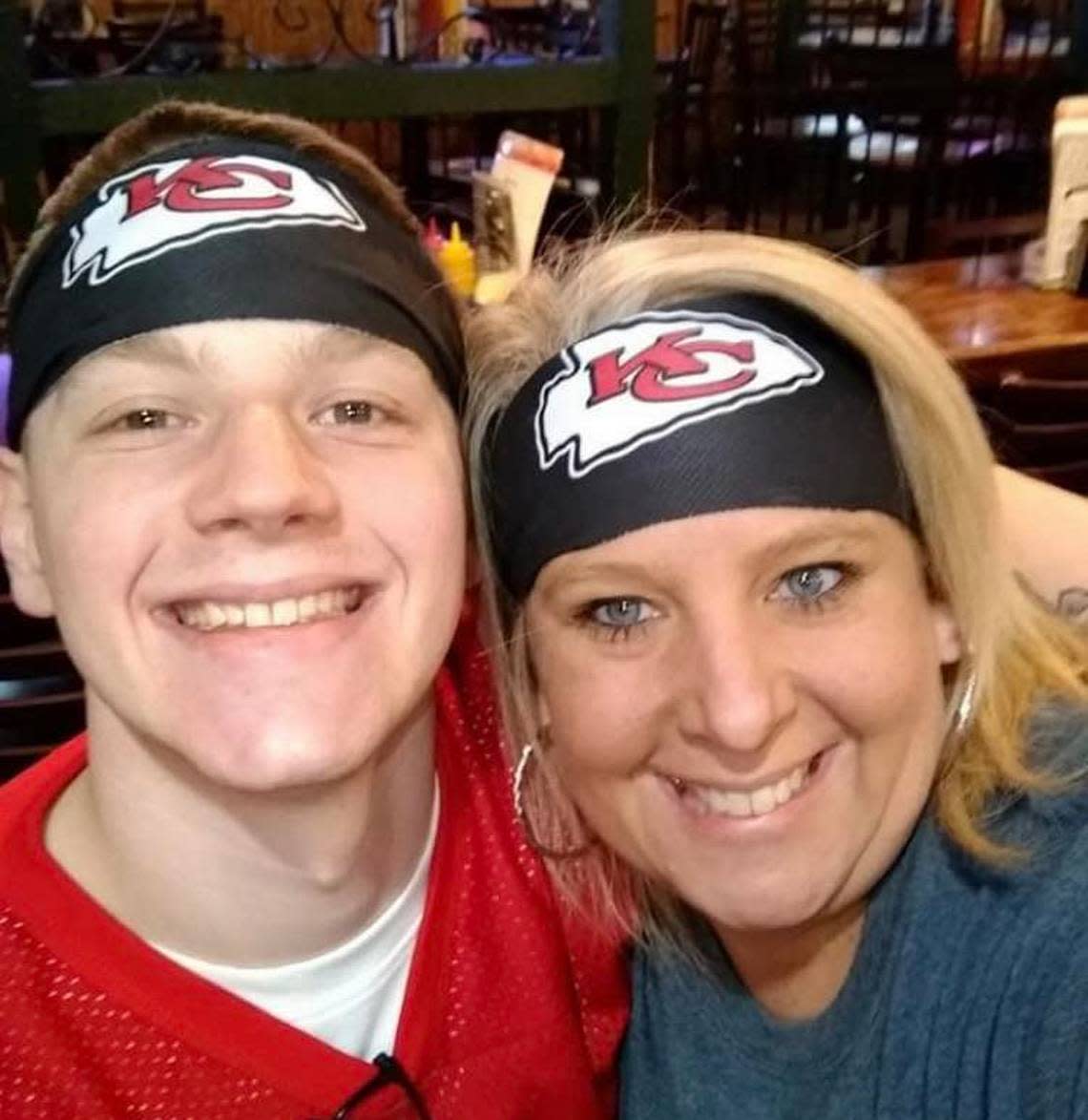
In an ongoing investigation, The Star has exposed the toll fentanyl has taken on the nine-county Kansas City area. The series has narrowed in on the broad trail of destruction this crisis has left behind and how no age, race or demographic has been spared.
The Star has taken its reporting out into the community, distributing literature and hundreds of doses of Narcan, a medication that reverses the effects of fentanyl, with the purpose of further explaining the devastation the drug has caused.
In the coming days, another story will show how one police department decided early on to attack the drug in a new way and has had success.
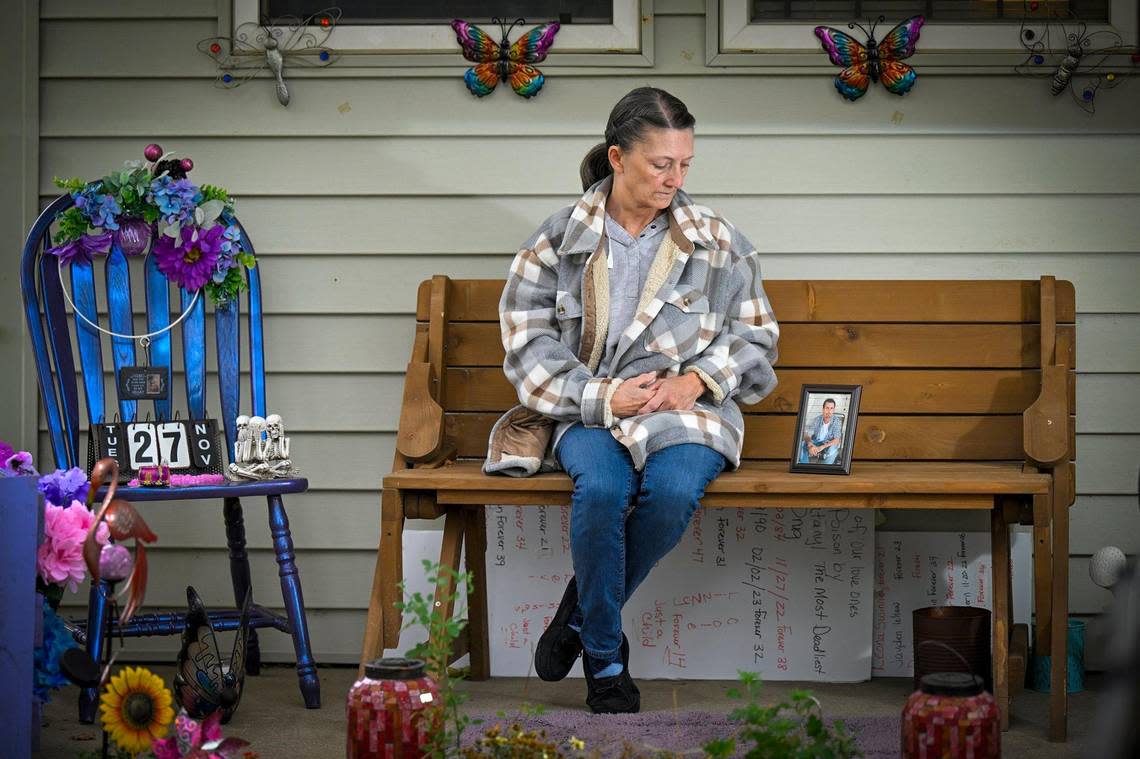
This report focuses on investigations of fentanyl deaths and how and why many agencies in the area fail to hold anyone accountable.
Though police and prosecutors in at least two counties have joined forces to aggressively tackle the illicit drug together, few agencies in the rest of the region have made investigating fentanyl deaths a priority, the Star found. Some didn’t even begin tracking such cases until the last year or two, and others still don’t.
Many families The Star spoke to say they don’t believe the deaths of their children and relatives are taken as seriously as other investigations, despite the fact that in some communities there are more fentanyl deaths than homicides and traffic crashes.
In the fall of 2022, a nonprofit called TAG (Trauma, Addiction and Grief) Recovery collaborated with the Drug-Induced Homicide Foundation on an unscientific survey of more than 1,100 families in 45 states who have lost loved ones to fentanyl. Nearly half those responding — 47% — said there had been no investigation into their loved one’s death. More than 50% reported that the place of death was not treated as a crime scene, and 72% said no charges were filed against the person who distributed the deadly substances. And 17% reported losing more than one family member to fentanyl. “It takes a comprehensive plan to try to reduce and eradicate what's happening,” said Tracy Morrissey, a licensed clinical social worker who founded TAG after her son, Collin Hanshel, died from fentanyl in April 2020 at 18. “We have to lock up the dealers, we have to have better recovery options, we have to have education, we have to have border control. And we have to have better investigations.”
For example, in Johnson County alone, the number of fentanyl-related deaths — 149 from 2018 through 2022 — was nearly triple the number of homicides in the county during that time.
In Kansas City, health officials worry that if action isn’t taken now, the crisis will only spiral further out of control.
“If we don’t get ahead of the curve, it is going to get worse,” said Dr. Alex Francisco, the health department’s chief science officer, who was with Mayor Lucas last week to announce a new initiative to reduce fentanyl deaths.
Through months of reporting and talking to more than 100 people about this deadly drug, The Star has learned this: Fentanyl is not a problem for just police or prosecutors or even public health officials to solve alone. It’s a crisis that will take an effort from everyone to keep people of all ages from dying.
A crucial part of cracking down on fentanyl, though, is identifying and prosecuting those responsible for distributing the synthetic opioid, families and officials agree.
And in many communities across the area, that isn’t happening.
“The attitude of the detective is that my son got what he deserved, that he knew what he was doing,” said Lori Smith, of Independence, whose son, Matthew, died in February 2022 at 37.

Earlier this month, dozens gathered at the steps of the Kansas Capitol in Topeka on a Sunday afternoon to demand action. Before families stepped to the microphone to share their stories, one state lawmaker told the crowd that the flow of fentanyl, and the deaths that follow, must stop.
“Every one of those young people is somebody who we’re never going to find out what God’s plan (for them) was,” said Rep. Pat Proctor, a Leavenworth Republican. “We’re never going to find out what they were going to be. Because they just made one decision not knowing that it was going to end their lives.”
He called for accountability.
“The folks that are selling this stuff have got to be thrown in jail,” Proctor said as many began to applaud. “We have got to strengthen our laws. We’ve got to get these folks off the streets.”
‘A different animal that we have to attack’
Of the more than 50 families The Star spoke to, most said they feel police haven’t done nearly enough to lock up the lower-level, local dealers and sellers.
Their sons and daughters, siblings and close friends were sold an illegal, lethal drug — many never realizing that’s what they were given — and they want to know why no one is being held accountable. Why do some investigations just fizzle in a couple of months and families are told “case is closed?”
“They pretty much brushed it under the rug,” Katy Meggs said of her son Seth Barnes’ 2021 death from fentanyl. “This has been ignored. … I gave them the phone and passcode. The (Johnson County) Medical Examiner’s Office still has my son’s medication there that hasn’t been tested.”
She said she knows who sold Seth, 19, pills two days before he died in Shawnee. She has been “investigating” on her own the best she can, creating a timeline of events leading up to his death.
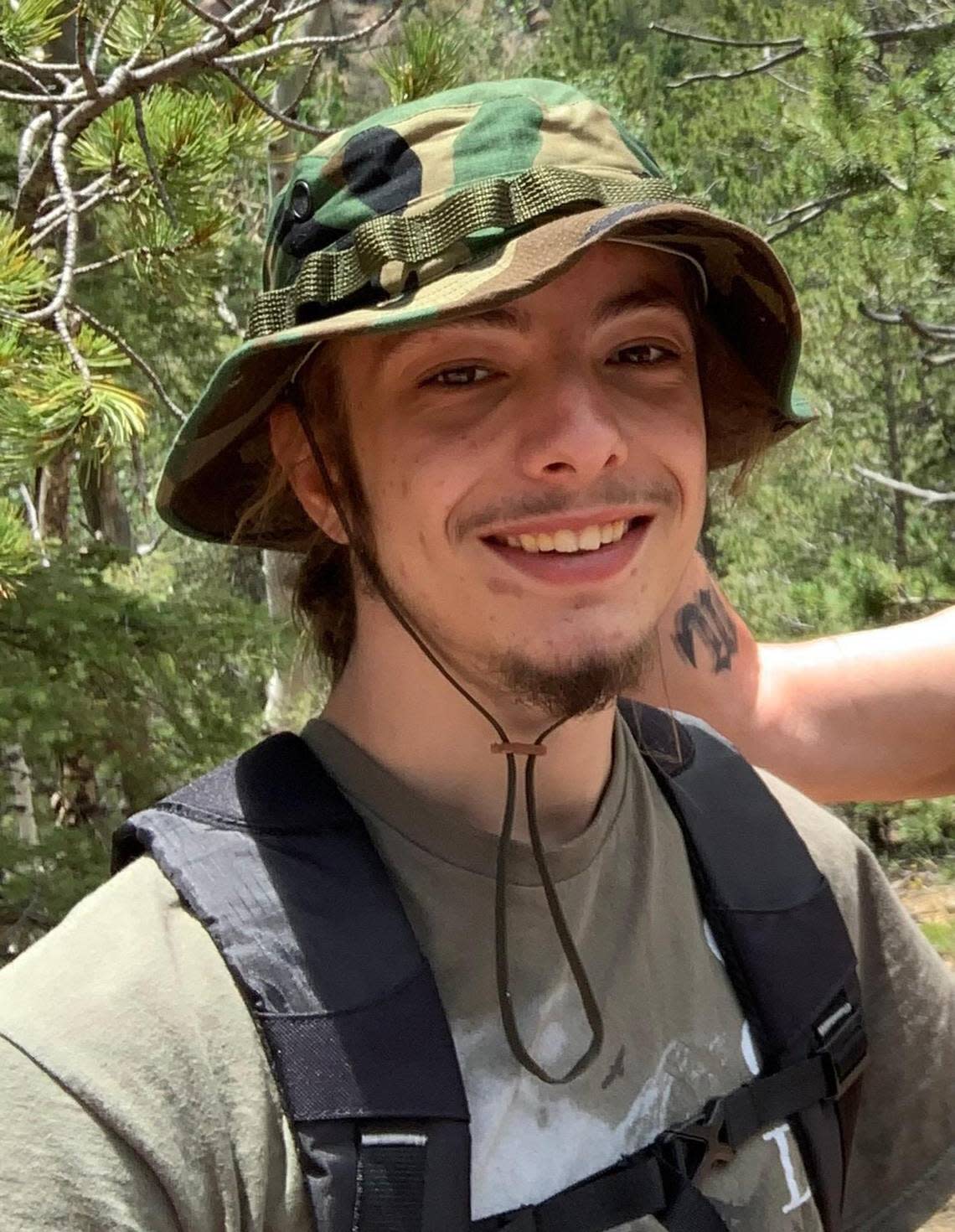
But she said his death investigation by police was cast aside after the detective found possible evidence on his phone of a marijuana trafficking operation.
“That’s what they were more concerned about,” Meggs said. “I feel like they look at it like he’s just another case of an addict who overdosed. That’s how I feel.”
Deaths from synthetic opioids, predominantly fentanyl, eclipsed the number of overdoses from prescription opioids and heroin in the mid-2010s, marking what some researchers refer to as the third wave of the country’s opioid epidemic.
And authorities insist this new drug epidemic is not only more deadly — it’s significantly more challenging to investigate and prosecute.
When methamphetamine blanketed the Midwest years ago and people were manufacturing it in small, mom-and-pop labs, police could build a case with paraphernalia and equipment used to make the stimulant.
But with fentanyl, it can come down to tracking one pill, and how and when someone bought it — and who sold it to them, several law enforcement officials said.
“People aren’t making fentanyl here in our region,” said Clay County Sheriff Will Akin. “It’s coming up from south of the border and being distributed all across the United States. And so we aren’t able to have those hard items, the tangible items, to present to a judge.”
Then, it comes down to: What do authorities really have? What leads and evidence are available to build a prosecutable case involving fentanyl?
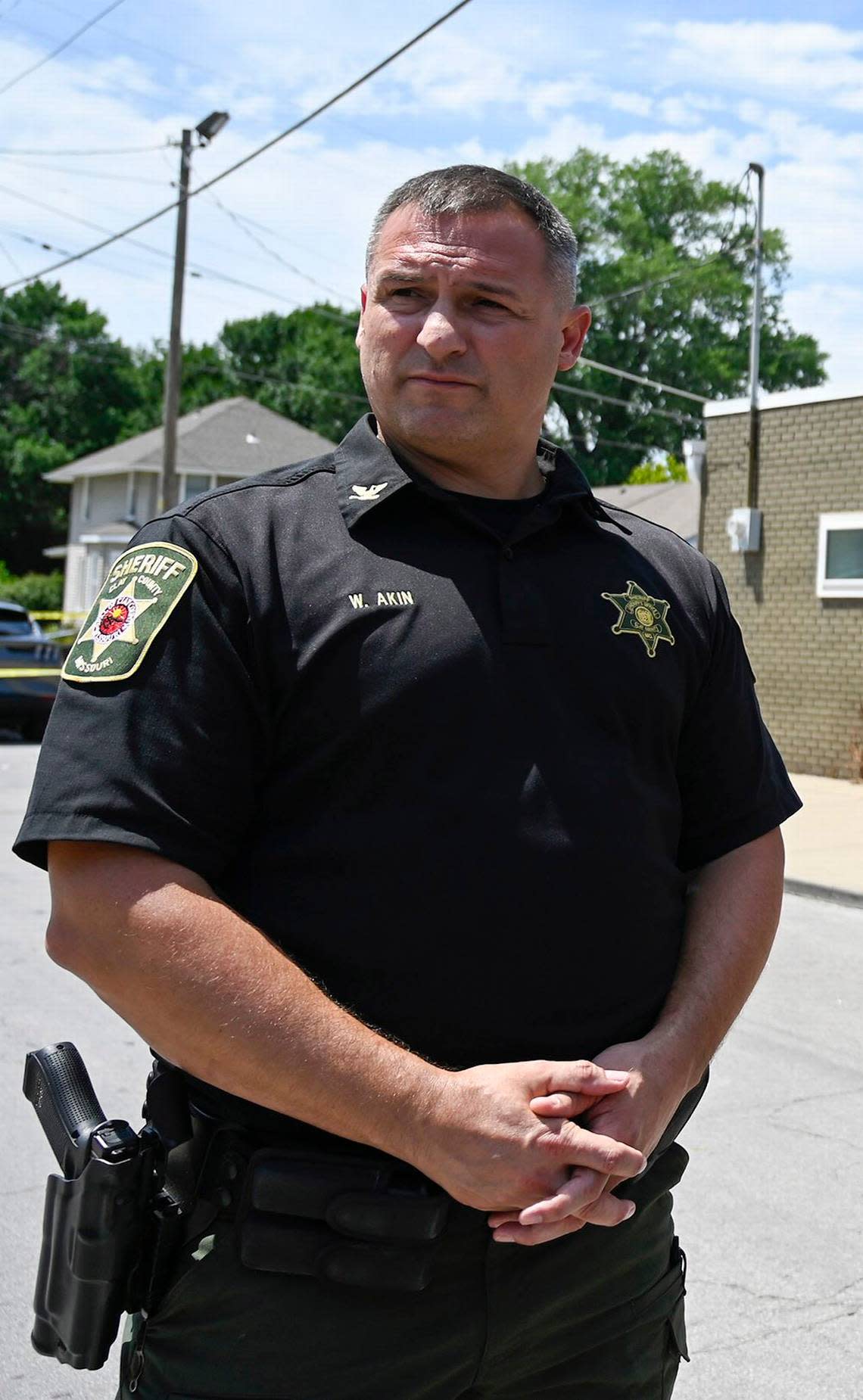
“We have names — that’s hearsay,” Akin said. “We have, ‘Oh, Johnny down the street’s barber’s son’s cousin is dealing heroin out of Freddy’s.’ Well, that’s all hearsay.”
Even identifying the drug at a scene takes more time with fentanyl than other drugs, authorities say.
“It’s just a different animal that we have to attack,” said Leavenworth County Attorney Todd Thompson. “It’s also much harder to prove because of the lethality of it.”
With marijuana, he said, you can conduct a field test to quickly identify what the substance is. You also can field test methamphetamine, cocaine and crack.
“And you wait for the results and are able to go forward with just a field test,” Thompson said. “But when you can’t field test something, because it could kill the officer, then it’s going to take a lot longer to be able to prosecute, which means that person has a lot more time to go back on the streets.”

Bobbi Caggianelli said her 19-year-old son, Adrian, died in Overland Park in July 2020 after buying what he thought was a Xanax pill. After his death, she and her husband gave police what they believed was sufficient evidence to track down the person he bought it from.
“We gave the police access to his phone and his computer and his email and his bank records,” Caggianelli said. “We looked at his Venmo information, because you could see who he paid. … I showed them his Venmo history and stuff. And they really didn’t do crap about it.
“We had to keep following up with them. And finally, they were like, ‘We don’t have enough to go on. We’re closing it.’”

In Leavenworth County, Vanessa Jackson said the detective in her son Caleb’s case told her “that there probably will be no charges (even) if they knew exactly who he got the pill from.”
“They’re really working on the bigger picture,” said Jackson, whose son died at 18 earlier this year. “(But) we want people to be arrested. We want these little fish, these little girls that are delivering these one or three pills to people.
“They have to know that they can’t get away with this.”

Cases don’t move forward
The Star’s investigation found that many of the fentanyl-related deaths in the nine-county region never reach a prosecutor’s desk. Instead, they often stay at local police departments, where it’s unclear how much investigating detectives do.
Reporters contacted 42 area law enforcement agencies, asking how many fentanyl deaths they have had and how many of those had been submitted for possible prosecution. Among the 25 that responded, some answers were surprising.
“This isn’t a statistic we track,” a crime analyst from the Merriam Police Department said, “and is not something that can be accurately obtained from our records management system.”
That analyst pointed out that the Johnson County agency did investigate the 2020 fentanyl-related death of 2-year-old JayPee Luciano Morales. The investigation led to the conviction and prison sentences of the boy’s parents and another man.
Police in Kansas City, Kansas, have recorded 115 fentanyl-related deaths since 2020, the year they began tracking them. Of those, eight have resulted in charges filed in Wyandotte County and two in other jurisdictions. Charges are pending in six other cases. Several other fentanyl-related deaths are still under investigation.
If a case can’t be made on a death, KCK police often pursue a distribution charge. Last year, the Wyandotte County district attorney charged 16 people with distribution of fentanyl, and 25 distribution cases have been filed so far this year, police told The Star.
Leavenworth police investigated seven fentanyl-related deaths in recent years, and though investigations are ongoing, no fentanyl case has been officially presented for possible charges yet.
None of the three fentanyl-related deaths in Smithville or the four deaths in North Kansas City since 2018 were presented for prosecution, according to police in those cities. And of the five fentanyl-related deaths in Raymore, charges have been filed in one case and another is pending.
In Johnson County, Gardner police investigated five deaths and submitted one to the district attorney. And in Overland Park, 35 people have died from fentanyl from 2018 through mid-September of this year.
An Overland Park police spokesman said to contact prosecutors on charges that were presented or filed.
Johnson County District Attorney Steve Howe said he and his office have charged eight cases in the county since 2018, and another seven are under review.
“We have charged two from Overland Park and one from Olathe,” Howe said. “We have had one case submitted that we declined to file charges.
“We work with the law enforcement agencies throughout the investigation,” Howe said. “The biggest challenge is connecting the purchase of the drug from a specific individual to the cause of death. In some instances the victim has multiple drugs in their system, which makes it difficult to determine which drug caused their death.”
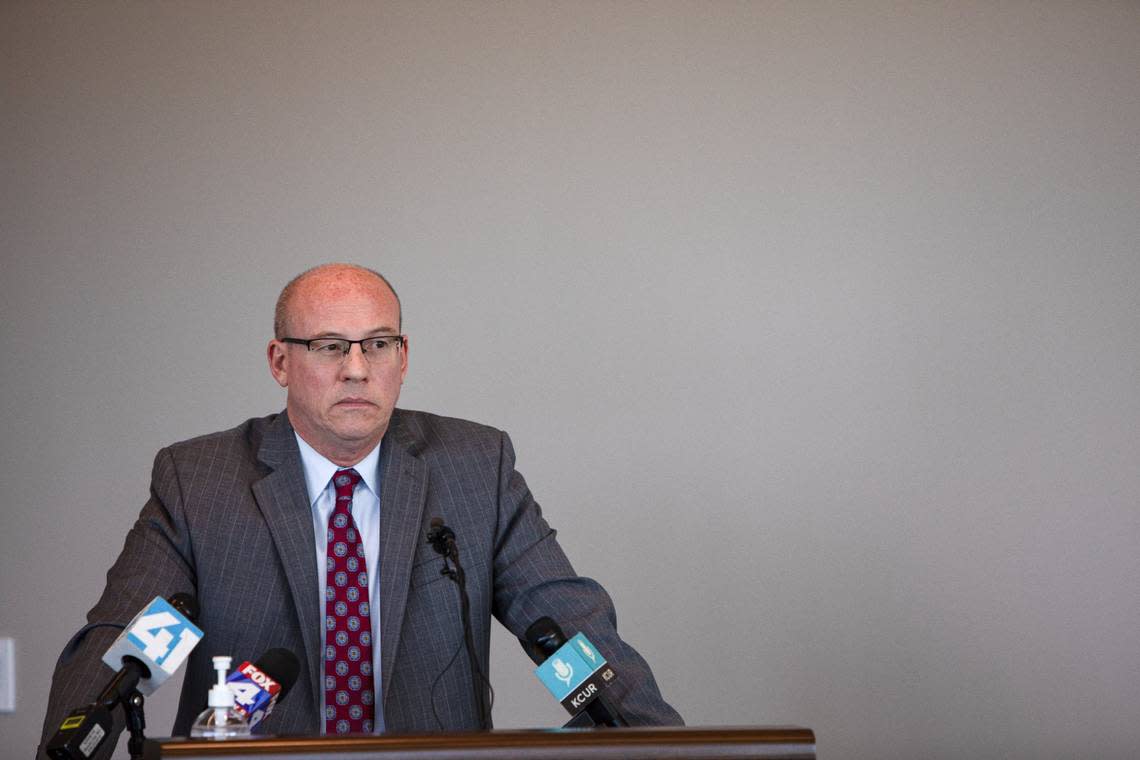
The Kansas City Police Department only began tracking these deaths with the High Intensity Drug Trafficking Areas program in the last couple of years. In 2022, 93 people died of “overdose fatalities,” police said. Through mid-September of this year, the city had recorded 94 fatalities.
Sgt. Jacob Becchina, police spokesman, said the tracker does not indicate whether charges were presented or show the outcome of any charges.
“Our investigators advised the cases are very rarely presented for prosecution for overdose alone,” Becchina said. “Occasionally a case will be presented with related charges (possession, sales, distribution, etc).
“… They did not have any instances during this time frame of a case presented on overdose alone.”
After Linda Elder’s son, Brandon, 38, died from fentanyl last November in Kansas City, she went through his cellphone and came across a recent voice message from the man she believed was his dealer.
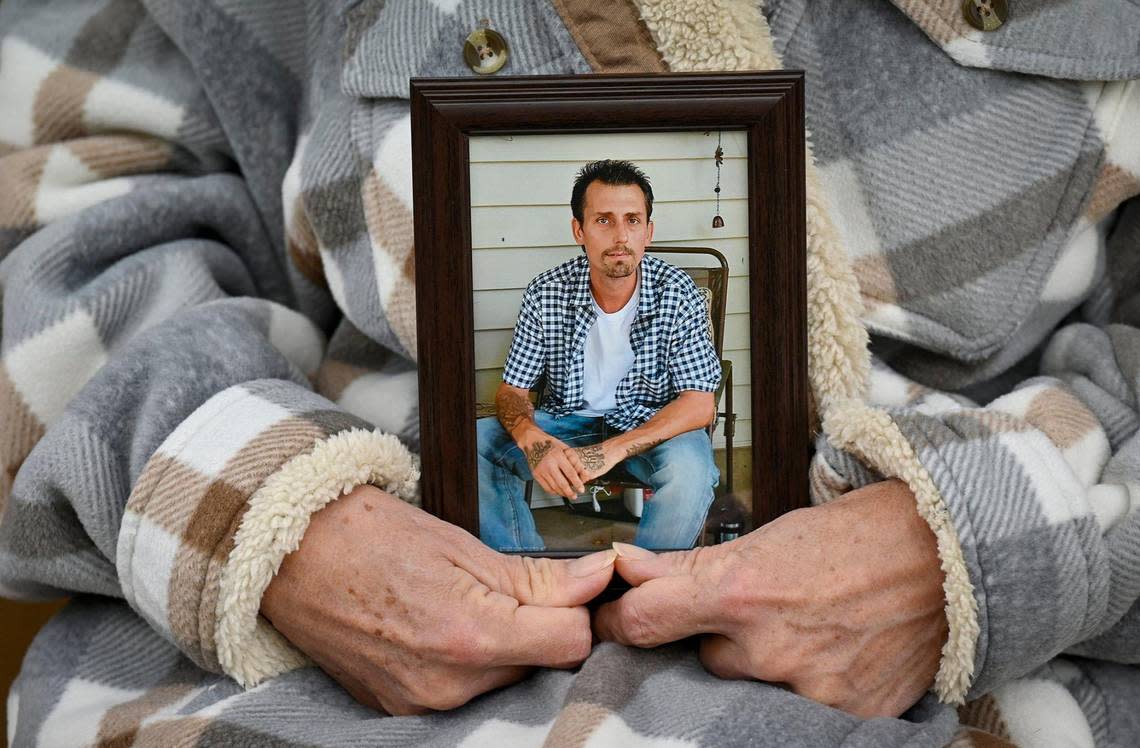
That man’s phone number, Elder said, was the last one Brandon had called the morning he died, and someone from that number had called Brandon back that day. After her son’s death, Elder used his phone to call the number.
The man who answered told her his name was Steve.
“And I said, ‘You know your name isn’t Steve,’” Elder said. “‘You killed my son.’ He hung up on me and he wouldn’t answer the phone anymore.”
Elder said she showed Brandon’s phone to the detective and played the voice message.
“She didn’t take the phone or any messages or take down the guy’s phone number,” Elder said. “None of that. And she told me there’s not a whole lot that we can really do about it. That was the only time I saw the detective.”
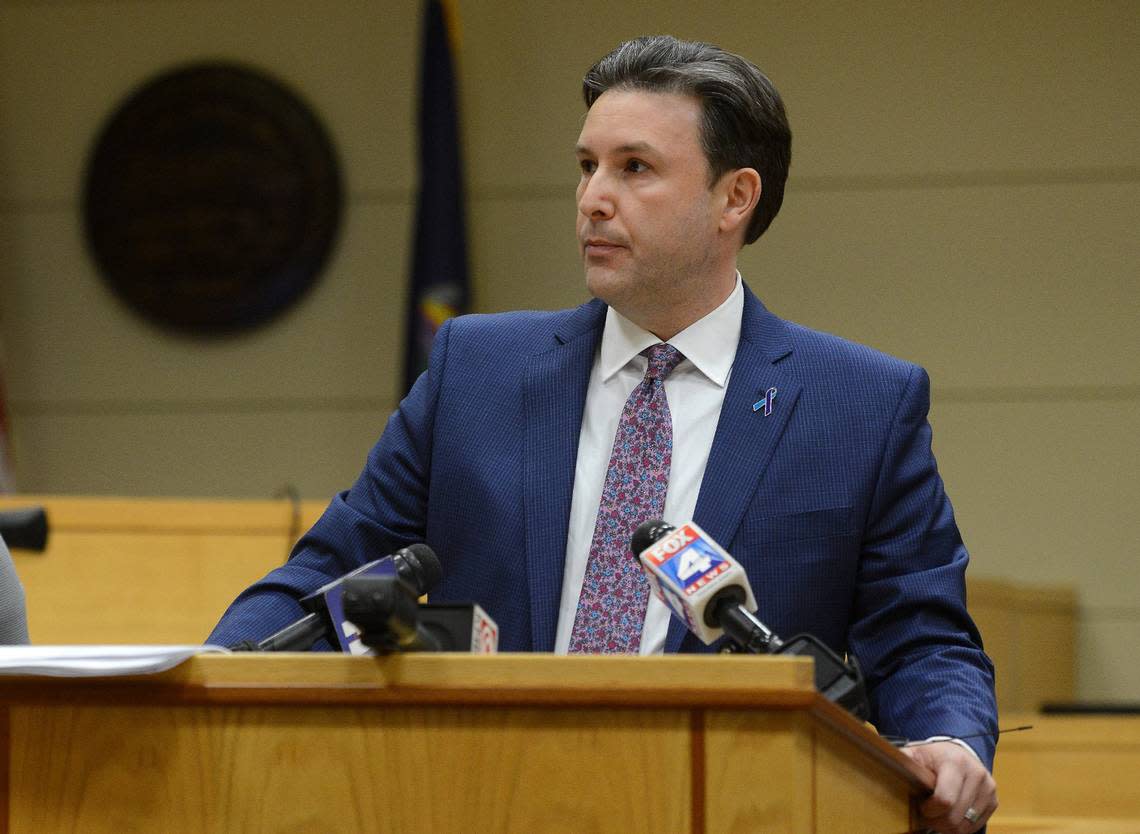
Prosecutors across the area have spoken to families who are frustrated that more people haven’t been charged after a fentanyl death.
Thompson, the Leavenworth county attorney, said he gets where they are coming from, but says it’s not that easy.
“They want their pound of flesh and I understand that,” he said. “But we need to be able to prove it.”
Fentanyl’s youngest victims
The Star’s investigation initially focused on how dozens of babies and toddlers have died in Missouri and Kansas after exposure to the drug inside homes, hotel rooms and even in a city park. Seven of those children — ages 10 months to 2 years — died in Jackson County last year.
In late September, Jackson County Prosecutor Jean Peters Baker told The Star that police had not submitted four of those deaths to her office for possible charges. Of the three cases she said police did submit, she filed charges in two — one from Independence and one from Kansas City.
Not only did Baker say her office hadn’t received any of the four remaining cases, she said she wasn’t even aware of those children’s deaths until The Star told her.
“A hundred percent surprised,” she said. “I would have thought I would always be notified about a dead child.”
Police officials, though, insisted to The Star on Wednesday evening that detectives had submitted two cases to the prosecutor’s office in late January of this year. Another child’s death is still under investigation, police said, and the fourth case has been closed by detectives.
“During the course of an investigation, the collaboration between detectives and the prosecutors office is not something that is documented or recorded,” police said in an email to The Star on Wednesday evening. “If/when a case is submitted it will be documented.”
But Baker’s office continued to say that no such documentation existed in their records system.
Until Thursday evening.
After the story had been online, featured on The Star’s website for 12 hours, Baker’s office issued a statement correcting the information that had been previously given.
“Media reports today stated two potential criminal cases involving the fentanyl deaths of a child in Kansas City were not in the Jackson County Prosecutor’s Office records system, suggesting they were not submitted to us by police,” the statement read. “After further communication with the Kansas City, Missouri Police Department, however, and checks of our records management system, we have confirmed that those two cases were in fact submitted to the prosecutor’s office.
“They were not found initially because of entry errors into our system.”
The statement further detailed that the cases “have been and continue to be actively worked by detectives and prosecutors.” When contacted, the office did not elaborate.
“We accept responsibility for this oversight in information provided to the media,” the statement said. “We are committed to working closely with our partners to promote public safety and, especially, to protect children from harm.”
When asked to expand on what has happened with the cases since they were submitted in January, Michael Mansur, a spokesman for the prosecutor’s office, said in an email: “I wouldn’t be able to detail what’s happening with the investigation. I don’t know yet how quickly a decision will come on either case. I might know in the next week, but not tonight.”
Police did not immediately respond to a request for comment.
The question remains: Will anyone be held accountable in the deaths of those two young children?
‘Take care of business’
Of the police agencies that responded to the Star’s inquiry about fentanyl deaths, Olathe had among the highest numbers.
Since 2018, 42 people in Olathe have died from fentanyl — more than double the number of homicides in the city during that time frame. Those who died from the drug ranged in age from 17 to 59, the Star found.
But according to information provided by Olathe police in response to an open records request, only two of those cases were presented to prosecutors for possible charges.
The Star emailed Olathe police multiple times for comment, and Sgt. John Moncayo responded earlier this week.
“I appreciate you reaching out,” Moncayo said, “unfortunately, we will not be providing any more information than what is required by KORA (Kansas Open Records Act).”
Howe, the Johnson County DA, spoke in general terms regarding police efforts pertaining to fentanyl investigations.
“Law enforcement works very hard at investigating these cases,” he said. “Unfortunately, in some instances we are never able to put together sufficient facts/evidence to establish this connection.
“I am proud of the efforts of our local law enforcement in working with us to charge these cases.”

Among the 42 who died in Olathe was Lantz Tucker.
Crystal Tucker found her son’s lifeless body in his bed on March 4, 2020, inside the family’s Olathe home. His Madden NFL Xbox game was still playing on his TV, the controller in his hand.
She and her husband later would learn, through a message on his cellphone’s Snapchat app from two weeks before, that he had bought four “M boxes” — lingo for oxycodone pills — at a bar in Lawrence in mid-February.
Lantz, 22, gave two of the four pills to his friend, his mom said. He kept the others for himself.
“And Lantz actually had them for three weeks before he took one,” she said. “He only took one of them. The other one was found in his room.”
Tucker said she’s received “very limited details” from Olathe police about the investigation. “So I can’t really say they didn’t try hard enough, although nobody has been charged, so of course I think that.”
Two years after Lantz’ death, Michael Floersch, 28, died in Olathe.
A couple of days after Michael’s death in late April 2022, Sandy Toothman went to her son’s Olathe apartment to help remove his belongings. As she went through his drawers and closets, she began to find bottles and baggies of pills — a lot of them.
She called the Olathe detective assigned to the case and explained what she was finding. Ultimately, she took the pills she found to the police department. And that was it.

“I’ve not heard anything,” Toothman said. “As shabby a job as they did going in there and not getting all the drugs, they didn’t do their job. It is the sad truth.”
It’s not asking too much, she said, to know whether her son’s death was thoroughly investigated. That someone in law enforcement tried to find out who gave or sold him the fentanyl that killed him.
“You get law enforcement that works around this stuff and I think they get calloused. Is that the word?” Toothman said. “Yeah, you know, (they’re like) ‘I deal with this every day, blah, blah, blah.’ And I get it, I totally get it.
“But that doesn’t mean you don’t take care of business. And that business is trying to find where (the fentanyl) is coming from. …You know, my son made the choice to take those illegal drugs and paid the price with his life. Why then aren’t the dealers paying the price for selling the illegal drugs?”
Cases can take months, years to charge
About 18 months ago, when local authorities saw fentanyl deaths skyrocketing, the Jackson County prosecutor said she scheduled a few meetings with the district attorneys of Wyandotte and Johnson counties.
Baker wanted to address what they might collectively be able to do in an effort to go after the dealers.
“Because what I was bothered by at the time were cases I was hearing about through lawyers representing the victim, and I was having trouble getting any kind of investigation going on those cases of a drug sale that resulted in — if I could prove it — the death of the buyer,” Baker said.
She said she had a general location of where the drug transactions were occurring on the Kansas side. But no charges ever developed.
“We just couldn’t get any synergy going with that group,” she said. “I was frustrated, to be blunt about it.”
She did acknowledge that she and fellow prosecutors “are overwrought” with heavy caseloads and are busy: “I just felt like we should find a way to share information.”
Even when cases make it to the prosecutor, that doesn’t guarantee there’s enough to take them to court.
In many cases, investigators can’t determine where the pill came from. And in others, evidence may be available on the victims’ cellphones or social media accounts, but authorities can’t access them. Or the accounts, like ones on Snapchat, are set up in such a way that the information disappears after a certain amount of time.
“The way our law is, (though), and it’s the right way, we have to be able to prove beyond a reasonable doubt that this individual committed this crime,” Wyandotte County District Attorney Mark Dupree said. “And it is unlawful for us to pursue a case if we cannot do that. And our hope is that over time, we get that information.”
Indeed, cases in the KC area show that charges can often take many months and up to years to file.
But in multiple examples, the persistence has paid off.
One success story, Baker said, was a case involving the Lee’s Summit Police Department. A 23-year-old woman was found unresponsive in a bathtub in March 2019. A medical examiner later ruled that she died from drowning, but an “other significant condition” was acute heroin and fentanyl intoxication.
“It took a really strong police department investigation to get it to me,” Baker said. “They did everything we asked them to do. And then we filed.”
This was the case of Jared M. Daniels, who was charged seven months later with second-degree murder and delivery of controlled substances in the death of Taylor Stephens.
It was the first case in the county in which a drug dealer was charged in connection with a death from an overdose, Baker said.
Daniels pleaded guilty in September 2022 to involuntary manslaughter-first degree and delivery of a controlled substance and was sentenced to five years’ probation. He also was ordered to 120 days of jail time.
“The Lee’s Summit Police Department deserves the community’s commendation for not giving up,” Baker said in a news release at the time. “They kept working to get us to these charges.”
Another case, this one across the state line, took nearly two years to bring charges.
In September 2021, an 18-year-old Shawnee Mission East student died after she ingested a pill that turned out to be a fake Percocet. She and two friends had each bought a pill for $30 apiece. It wasn’t until June of this year that DA Howe charged a Grandview man with distribution of a drug that caused her death.
According to the affidavit detailing the allegations, Cameron Bryant, then 27, is accused of selling the pill — containing fentanyl — that the high school student smoked right before she died. The pills were referred to as “percs” (Percocets) in text messages with Bryant during multiple communications over a two-month period, court records show.
It isn’t clear which of the three friends initiated the conversations with Bryant. On July 23, 2021, the affidavit said, one of them texted “Steve P,” who prosecutors allege was Bryant.
“Yo… u know anyone with percs?”
Bryant allegedly responded: “i got em 30 a piece.”
Another request came in August, this one for two “percs.” And on Sept. 15, the affidavit said, the request was for three pills, which two of the three picked up at an apartment in Olathe late that night for $90.
The Shawnee Mission East senior was found dead in her bedroom the next day.
Howe would not comment on the ongoing case. He would only speak in general terms.
“When we go after individuals who sell these drugs that kill people, a lot of times we have to get business records, phone records, we have to really put together a circumstantial case,” he said. “Because most of the time, there’s nobody there that is an eyewitness.”
When Tony Mattivi became director of the Kansas Bureau of Investigation in January, he said his agents told him they were seeing street prices for synthetic opioids between $20 and $30 a pill. “We know that now, even in the more rural locations where it's difficult to get pills, they're in the $10 range,” he said. “And in the metros, they're $5 and below at the retail level….We had an undercover make a purchase in Kansas (in September), and she bought 2,000 pills for $4,600, so about $2.30 a pill wholesale.” Historically in Kansas, Mattivi said, the street prices for drugs tend to trail what they’re seeing along the Southwest border by about a year. “And right now in Nogales and Tucson, we're hearing that the street price of fentanyl pills is between 33 and 50 cents a pill.”
A more aggressive stand in Douglas County
On March 15, 2021, Lawrence police responded to a medical emergency call regarding an unresponsive man. When officers arrived at the location, they found Nickolas Byrum, 32, dead in an apartment bedroom.
According to court records, Byrum paid for his girlfriend to take a Lyft ride on March 14 to a Motel 6 in northeast Kansas City to buy $170 worth of heroin from someone named Danny, who was later identified as Daniele Leone. Byrum’s girlfriend then took the Lyft back to Lawrence, where the couple split the heroin that evening.
Around 9:30 p.m., Byrum texted Danny, his longtime drug dealer, saying the heroin was “fire (expletive deleted),” referring to the potency, and asking if he had a “new plug,” referring to his supplier, records show.
“Yea,” Danny responded 1 ½ hours later.
By morning, Byrum — who according to his obituary had four children — was dead. Toxicology results later showed he had fentanyl and heroin in his system. Byrum is one of 29 people in Lawrence who have died from fentanyl from 2020 through 2022, according to the police department’s most recent annual report.
David Greenwald, Douglas County’s senior assistant district attorney, said he strongly believed someone should be charged in the death.
“I called the U.S. Attorney’s Office in both Kansas and Missouri, the Western District, and begged them to take it because it’s a great fed case,” Greenwald told The Star. “They declined.

“I called Jackson County. I begged them to take it because we had video, we had phone records, we had, like PayPal records. I mean, it was the perfect case.”
They, too, declined, he said. So last year, Greenwald charged Leone himself with one felony count of distribution of a controlled substance causing death.
Leone pleaded guilty to voluntary manslaughter and unlawful distribution of a controlled substance and was sentenced Oct. 10 to 61 months in prison.
“It literally came down to: If we don’t charge it, there will be no accountability for this death,” said Suzanne Valdez, who became district attorney in January 2021.
Since he arrived in the summer of 2021, Greenwald said, the Douglas County DA’s office has filed charges in 15 to 20 drug overdose cases, all but three involving fentanyl. The office has yet to take a case to trial, instead securing guilty pleas with prison sentences.
Prosecutors work closely with police agencies in the county, even going out to overdose deaths no matter the time of day. Police know, prosecutors say, the tough stand the DA’s office takes on these cases.
“The big key is figuring out who distributed the drugs,” Greenwald said. “Once the Lawrence Police Department has figured that out, they’re very proactive in presenting a case to us. I don’t believe we’ve declined any cases that they’ve sent to us.”
Valdez has sent the message, Greenwald said, not to shy away from these cases or any others just because they are difficult to prosecute.
“She’s empowered me that we’re a lot more aggressive about charging cases that are hard, because these are homicides,” he said, referring to overdose deaths.
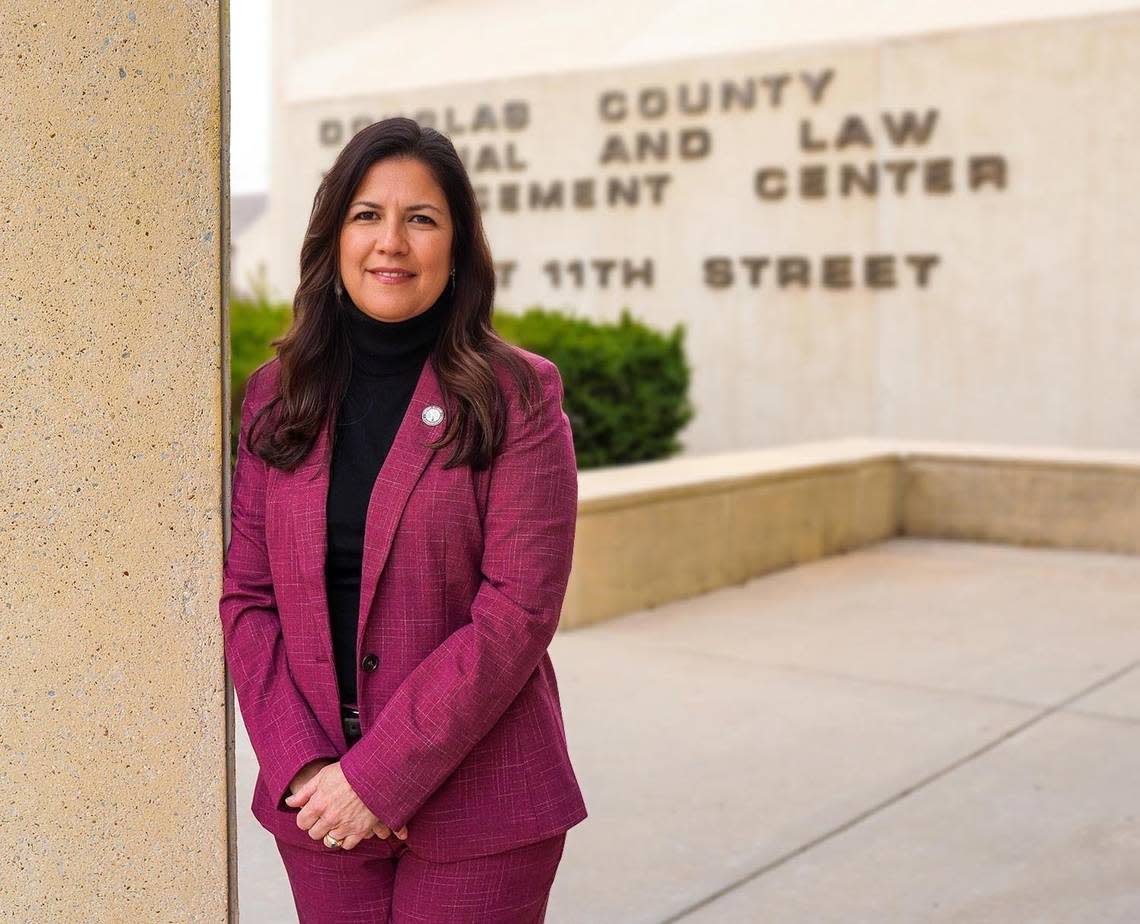
And Greenwald also knows how personal the fight has become for Valdez.
Her brother, Christopher, 48, died in Phoenix in November 2019 while in his recliner watching TV. Initially, authorities said — and the family believed — it was a heart attack. Six months later, the death certificate came.
It showed he died from fentanyl.
The family was stunned. Never would they have thought, Valdez said, that fentanyl would have killed Christopher, a Gulf War veteran, electrician and father of six.
“He was an alcoholic, he drank a lot of beer,” she said. “But other than that, he didn’t do illicit drugs.”
Police never investigated, she said.
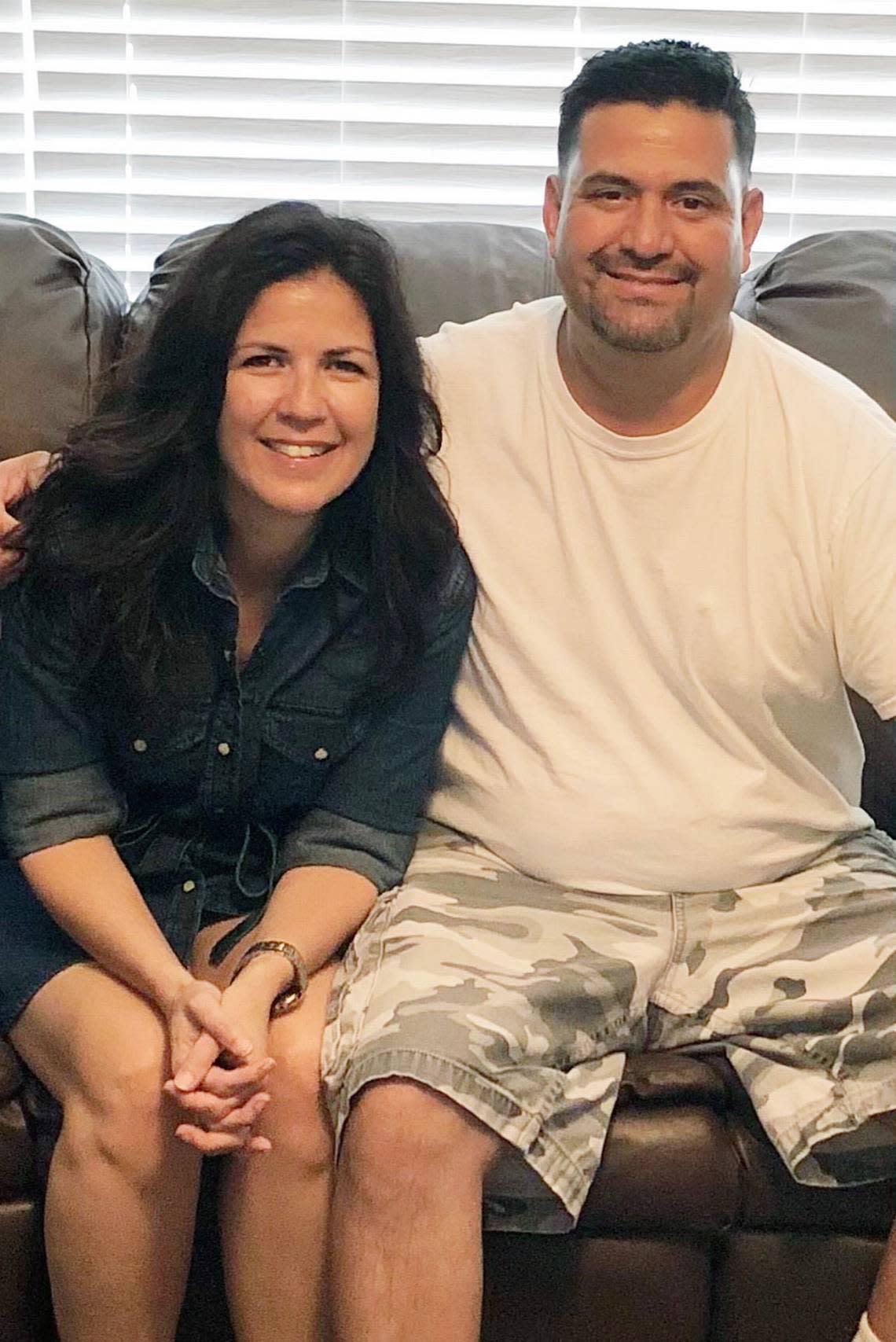
“They just treated it like he was a drug user, which he wasn’t,” Valdez said. “And so that always stuck with me.”
The family was able to “piece together” that her brother likely got a “pain pill” at a job site.
“We think he just took a pill for his lower back pain and was poisoned,” Valdez said, “and never, never woke up.”
The district attorney doesn’t work fentanyl cases herself. She leaves that to Greenwald and others on her staff.
“I don’t believe I’m objective, with my personal experience,” she said. “These are cases I won’t touch. … I feel like that’s something I cannot do. Having the power and prosecuting those cases is not something that I’m comfortable with.”
But she’s a sounding board for Greenwald and others.
“Suzanne is aware, she’s in the loop,” Greenwald said. “But she doesn’t come down to my office and tell me like, ‘You’re gonna file this motion. And then you’re gonna do this, then you’re gonna do that.’”
Before the end of the year, Greenwald will go before a judge on at least two fentanyl-related death cases. Both are preliminary hearings.
“I feel very passionately and confident, very confident, about all of our cases that, you know, we can prove the crime.”
Valdez said she understands what families who have lost loved ones to fentanyl are going through. And she thinks about her brother every day.
“I mean, every day,” she said. “There’s not a day that goes by that I don’t. My heart aches for all of these people who are suffering. It’s indescribable.”
Illustrations by Neil Nakahodo and page development by Susan Merriam and David Newcomb.
